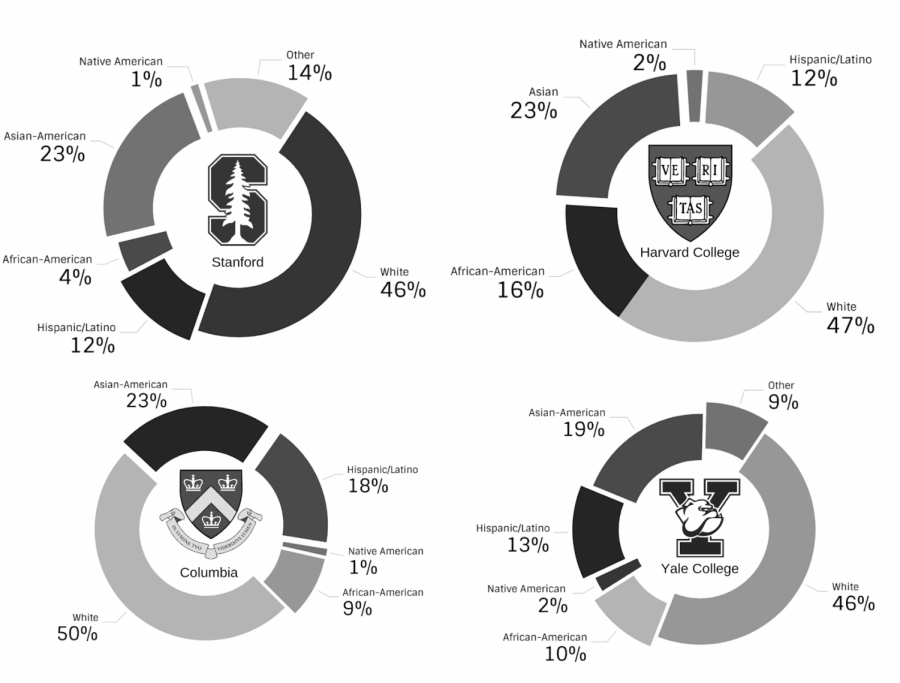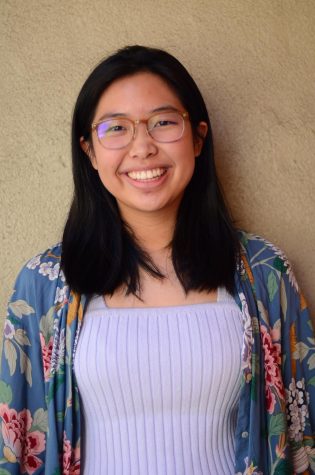Affirmative Action: Stop racial quotas and start race-conscious thinking
December 9, 2018
“First things first, you should know that you need to work twice—no thrice—as hard as any other white person. And I say this not because you don’t work hard, but that is what society recognizes.” And that was what my first meeting with my Asian college counselor pertained to.
However, eight years before the age of college planning arrived, my life was already filled with considerations about selecting a renowned college, participating in competitions and joining all the extracurriculars. As a 15-year-old, my older brother was informed that it was late for him to develop strong talents to impress the Ivy League Universities. So his counselors turned to me, only seven years old, informing my parents about developing a skill that makes me stand out.
The original aim of Affirmative Action, an outcome from the 1960s civil rights movement, was to diversify schools and employment opportunities, especially for African Americans. Yet, now Affirmative Action is regarded as unjust.
The issue here is not with Affirmative Action, but what it became in society. As per the words by the supporters of the lawsuit against Harvard University, “Stop Asian Quota.” Yes, Ivies, stop the quota. Stop thinking about only admitting a certain number of Asians per year. But that does not mean stop being racially conscious. Being racially conscious means being cognizant of the challenges individuals face due to systems of discriminatory inequalities.
The Harvard lawsuit is, simply put, a lawsuit over an Asian quota. Statistics on minority groups of the class of 2022 reveal that 22.9% of the admitted population is Asian American, 15.2% is African American, 12.9% is Latino or Hispanic, 1.9% is Native American and 0.4% is Native Hawaiian. One main point that schools often comment on regarding race-balance is that while Asian Americans only account for 5.6% of the U.S. population, according to the 2010 census, they account for 22.9% of Harvard’s class of 2022.
Affirmative action’s purpose is to maintain diversity, especially protecting underrepresented minority groups. It seeks to include students from different backgrounds, with different athletic and artistic abilities and with different viewpoints.
What many Asian Americans regard as most unfair is the fact that it is more difficult for an Asian to be accepted into an Ivy League school than any other racial groups, including Caucasians. Yet, as a minority group, Asian Americans are also subject to racism, prejudice and other difficulties. A study by the Pew Research Center on Asian Americans revealed that 19% of Asians Americans “have personally experienced discrimination in the past year”. Furthermore, many come from first, second or third generation immigrants whose parents or grandparents arrived to a new country alone in search of a better life for their families. This study continued to show that 73% viewed the U.S. as having better “opportunity to get ahead” and 62% said the U.S. had “conditions for raising children.” Additionally, their families do not have extended connections that could help them in a relatively new country.
This acceptance difficulty is partially credited to the Asian quota, but also extends from innate biases in the admission process. William Fitzsimmons, the dean of admissions at Harvard, revealed in the trial that Asian students are held to a higher standard. For example, in the case of PSAT scores, an Asian male needs at least a 1380 to receive an interest letter or a recruitment letter from Harvard. However, a member of a Hispanic, Black, Native American or other minority group only needs to score 1100. Additionally, in regard to sparse country or rural states in America, white and “other” students only need a 1310, but not to Asians. Moreover, information from an analysis of over 160,000 student records revealed that Harvard rated Asian students lower on certain positive traits, such as likability, courage, kindness, “positive personality” and “widely accepted”. According to this information, wouldn’t there be a possibility that Harvard’s admission process will continue to hurt Asian Americans even after ridding Affirmative Action?
Harvard’s stance is that this ruling against this school hurts diversity. And yes, Harvard is correct in this statement, ending Affirmative Action will definitely hurt minority groups such as Hispanics and African Americans.
“No one should be admitted to a school purely based on their race” Hasan Minhaj said on Netflix’s Patriot Act. As per his words, this large debate shouldn’t be about whether a quota on a certain group should exist or not, but rather how colleges should be more racially conscious towards all people. Mentioning quotas don’t help and neither do character prejudices against a certain group of people. However, being racially conscious, not racially prejudiced, is vital to the fairness and quality of higher education.
This piece was originally published in the pages of The Winged Post on December 6, 2018.


















![“[Building nerf blasters] became this outlet of creativity for me that hasn't been matched by anything else. The process [of] making a build complete to your desire is such a painstakingly difficult process, but I've had to learn from [the skills needed from] soldering to proper painting. There's so many different options for everything, if you think about it, it exists. The best part is [that] if it doesn't exist, you can build it yourself," Ishaan Parate said.](https://harkeraquila.com/wp-content/uploads/2022/08/DSC_8149-900x604.jpg)




![“When I came into high school, I was ready to be a follower. But DECA was a game changer for me. It helped me overcome my fear of public speaking, and it's played such a major role in who I've become today. To be able to successfully lead a chapter of 150 students, an officer team and be one of the upperclassmen I once really admired is something I'm [really] proud of,” Anvitha Tummala ('21) said.](https://harkeraquila.com/wp-content/uploads/2021/07/Screen-Shot-2021-07-25-at-9.50.05-AM-900x594.png)







![“I think getting up in the morning and having a sense of purpose [is exciting]. I think without a certain amount of drive, life is kind of obsolete and mundane, and I think having that every single day is what makes each day unique and kind of makes life exciting,” Neymika Jain (12) said.](https://harkeraquila.com/wp-content/uploads/2017/06/Screen-Shot-2017-06-03-at-4.54.16-PM.png)








![“My slogan is ‘slow feet, don’t eat, and I’m hungry.’ You need to run fast to get where you are–you aren't going to get those championships if you aren't fast,” Angel Cervantes (12) said. “I want to do well in school on my tests and in track and win championships for my team. I live by that, [and] I can do that anywhere: in the classroom or on the field.”](https://harkeraquila.com/wp-content/uploads/2018/06/DSC5146-900x601.jpg)
![“[Volleyball has] taught me how to fall correctly, and another thing it taught is that you don’t have to be the best at something to be good at it. If you just hit the ball in a smart way, then it still scores points and you’re good at it. You could be a background player and still make a much bigger impact on the team than you would think,” Anya Gert (’20) said.](https://harkeraquila.com/wp-content/uploads/2020/06/AnnaGert_JinTuan_HoHPhotoEdited-600x900.jpeg)

![“I'm not nearly there yet, but [my confidence has] definitely been getting better since I was pretty shy and timid coming into Harker my freshman year. I know that there's a lot of people that are really confident in what they do, and I really admire them. Everyone's so driven and that has really pushed me to kind of try to find my own place in high school and be more confident,” Alyssa Huang (’20) said.](https://harkeraquila.com/wp-content/uploads/2020/06/AlyssaHuang_EmilyChen_HoHPhoto-900x749.jpeg)








